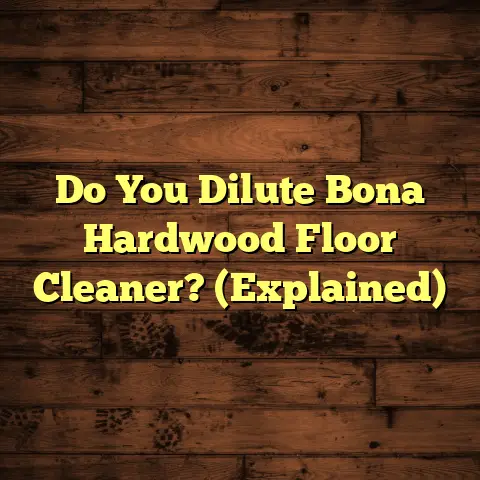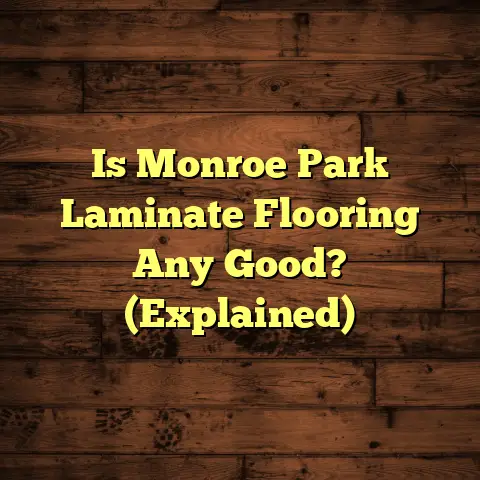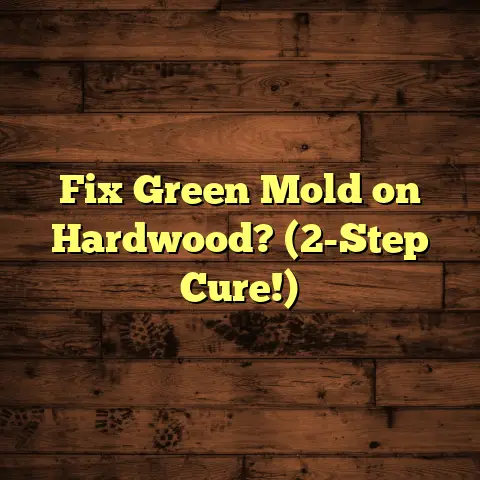Baking Soda on Hardwood? (*4 Risks to Know!*)
Nothing makes my heart sink quite like seeing a beautiful hardwood floor that’s been unintentionally damaged by well-meaning homeowners.
Imagine this: the sun is streaming through your windows, highlighting the rich grain and warm tones of your pristine hardwood floor.
It’s the heart of your home, a testament to your good taste and investment.
You feel a sense of pride every time you walk across it.
But then… the unthinkable happens.
A spill!
Or maybe just a general desire to freshen things up.
You grab the trusty box of baking soda, thinking it’s a harmless, natural cleaner.
Clouds of white powder puff into the air as you sprinkle it across the surface.
It seems so innocent, so… clean.
But a knot of dread starts to form in your stomach.
Is this really the best thing for my precious hardwood?
Let me tell you, as a flooring contractor, I’ve seen firsthand the damage that baking soda can inflict on hardwood floors.
It’s not the miracle cleaner you might think it is.
In fact, it can be downright disastrous.
So, before you reach for that box of baking soda, let’s dive into the four major risks you need to know.
Risk #1: Moisture Damage – The Silent Killer
Wood and water, as you probably know, aren’t the best of friends.
Hardwood floors are especially susceptible to moisture damage.
And that’s where baking soda comes in.
When you mix baking soda with water to create a cleaning paste, you’re essentially introducing a significant amount of moisture to your floor.
“But it’s just a little bit!” you might say.
Think about it this way: wood is porous, like a sponge.
It absorbs moisture from the air, from spills, and yes, from your cleaning solutions.
Too much moisture, and the wood starts to swell.
This can lead to warping, buckling, and cupping.
These are all expensive problems to fix, believe me!
According to the National Wood Flooring Association (NWFA), improper cleaning methods are a leading cause of moisture-related damage in hardwood floors.
They estimate that moisture issues account for up to 30% of all hardwood floor failures.
That’s a huge number!
And the scary thing is, the damage isn’t always immediately visible.
It can take weeks, months, or even years for the effects of moisture to become apparent.
By then, it might be too late to save your floor.
I’ve seen floors where the planks have completely detached from the subfloor due to excessive moisture.
The cost to repair or replace those floors was astronomical.
Trust me, it’s not worth the risk.
Risk #2: Residue Buildup – The Dullness Dilemma
Have you ever noticed how your hardwood floors can sometimes look dull, even after you’ve cleaned them?
It could be due to residue buildup.
Baking soda, while mildly abrasive, doesn’t always dissolve completely in water.
This can leave behind a fine, white powder on the surface of your floor.
Over time, this residue accumulates, creating a dull film that obscures the natural beauty of the wood.
It’s like trying to look through a dirty window.
You just can’t see the true colors and details.
And here’s the kicker: this residue actually attracts dirt and dust.
So, you end up in a vicious cycle of cleaning that never really gets your floors clean.
I once had a client who had been using a baking soda solution to clean her hardwood floors for years.
She couldn’t understand why they always looked so dingy.
When I inspected her floors, I found a thick layer of baking soda residue embedded in the grain of the wood.
It took a professional cleaning with specialized equipment to remove the residue and restore the floor’s original luster.
She was shocked at the difference.
The moral of the story?
Don’t let baking soda residue steal the shine from your hardwood floors.
Risk #3: Chemical Reactions – The Finish Fiasco
Hardwood floors are typically finished with a sealant that protects the wood from scratches, stains, and moisture.
These finishes can be oil-based, water-based, or even wax-based.
And some of these finishes don’t play well with baking soda.
Baking soda is alkaline, meaning it has a high pH level.
When it comes into contact with certain finishes, it can cause a chemical reaction that leads to discoloration, etching, or even complete removal of the finish.
Imagine pouring a mild acid on your car’s paint job.
That’s essentially what you’re doing when you use baking soda on a vulnerable hardwood finish.
I’ve seen floors where the finish has been completely stripped away in patches, leaving the bare wood exposed.
This not only looks bad, but it also makes the floor more susceptible to damage.
According to a study by the Forest Products Laboratory, certain types of polyurethane finishes are particularly vulnerable to alkaline cleaning agents like baking soda.
The study found that prolonged exposure to baking soda can cause the finish
to soften, crack, and eventually peel away from the wood.
https://www.fpl.fs.fed.us/
Before you use any cleaning product on your hardwood floors, it’s crucial to know what type of finish you have.
If you’re not sure, consult with a flooring professional.
It’s better to be safe than sorry.
Risk #4: Ineffective Cleaning – The Grime Game
Let’s be honest: we all want a cleaning product that’s effective, affordable, and easy to use.
Baking soda seems to fit the bill, right?
It’s cheap, readily available, and supposedly a great all-purpose cleaner.
But when it comes to hardwood floors, it often falls short.
While baking soda can be effective at removing some types of stains and odors, it’s not a powerful degreaser or disinfectant.
It doesn’t have the enzymes or surfactants needed to break down grease, grime, and bacteria that can accumulate on hardwood floors.
In fact, using baking soda can sometimes make the problem worse.
The abrasive nature of baking soda can scratch the finish of your floor, creating tiny crevices where dirt and grime can become trapped.
And as we discussed earlier, the residue buildup can also attract more dirt.
So, you end up with a floor that looks clean on the surface but is actually harboring a hidden layer of grime.
I’ve seen floors that looked relatively clean to the naked eye, but when I used a professional cleaning solution and equipment, the amount of dirt that came up was shocking.
It was like peeling back a layer of grime that had been building up for years.
If you really want to get your hardwood floors clean, you need to use a cleaning product that’s specifically designed for hardwood.
These products are formulated to be gentle on the finish while effectively removing dirt and grime.
The Takeaway
So, there you have it: the four major risks of using baking soda on hardwood floors.
Moisture damage, residue buildup, chemical reactions, and ineffective cleaning.
It’s a recipe for disaster, my friends.
I know it can be tempting to reach for that box of baking soda, especially when you’re trying to save money or use natural cleaning products.
But when it comes to your hardwood floors, it’s simply not worth the risk.
Your hardwood floors are an investment.
They add beauty, warmth, and value to your home.
Treat them with the care and respect they deserve.
Use proper cleaning methods, choose the right cleaning products, and consult with a flooring professional when in doubt.
Remember, a little bit of knowledge and caution can go a long way in preserving the beauty and longevity of your hardwood floors.
Don’t let a seemingly harmless cleaning solution turn into a costly mistake.
Think before you sprinkle!





